Resume
Constitutional Lawyer Cover Letter Examples

May 29, 2025
|
12 min read
Craft your perfect constitutional lawyer cover letter: find your voice, defend your skills, and make a case for your candidacy that even the Supreme Court can't ignore. Stand out with precision and professionalism.
4.70 Average rating
Rated by 348 people
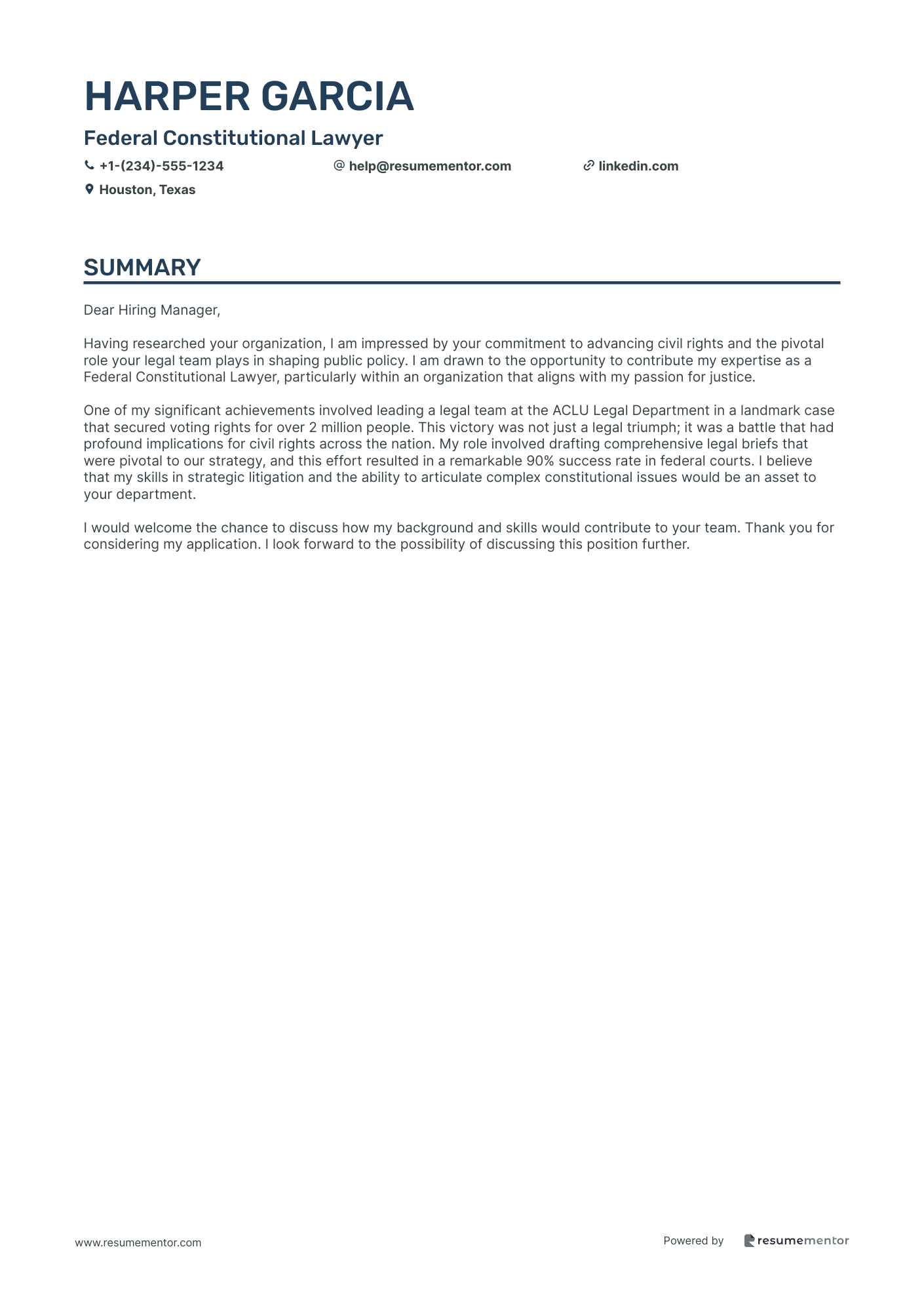
Federal Constitutional Lawyer
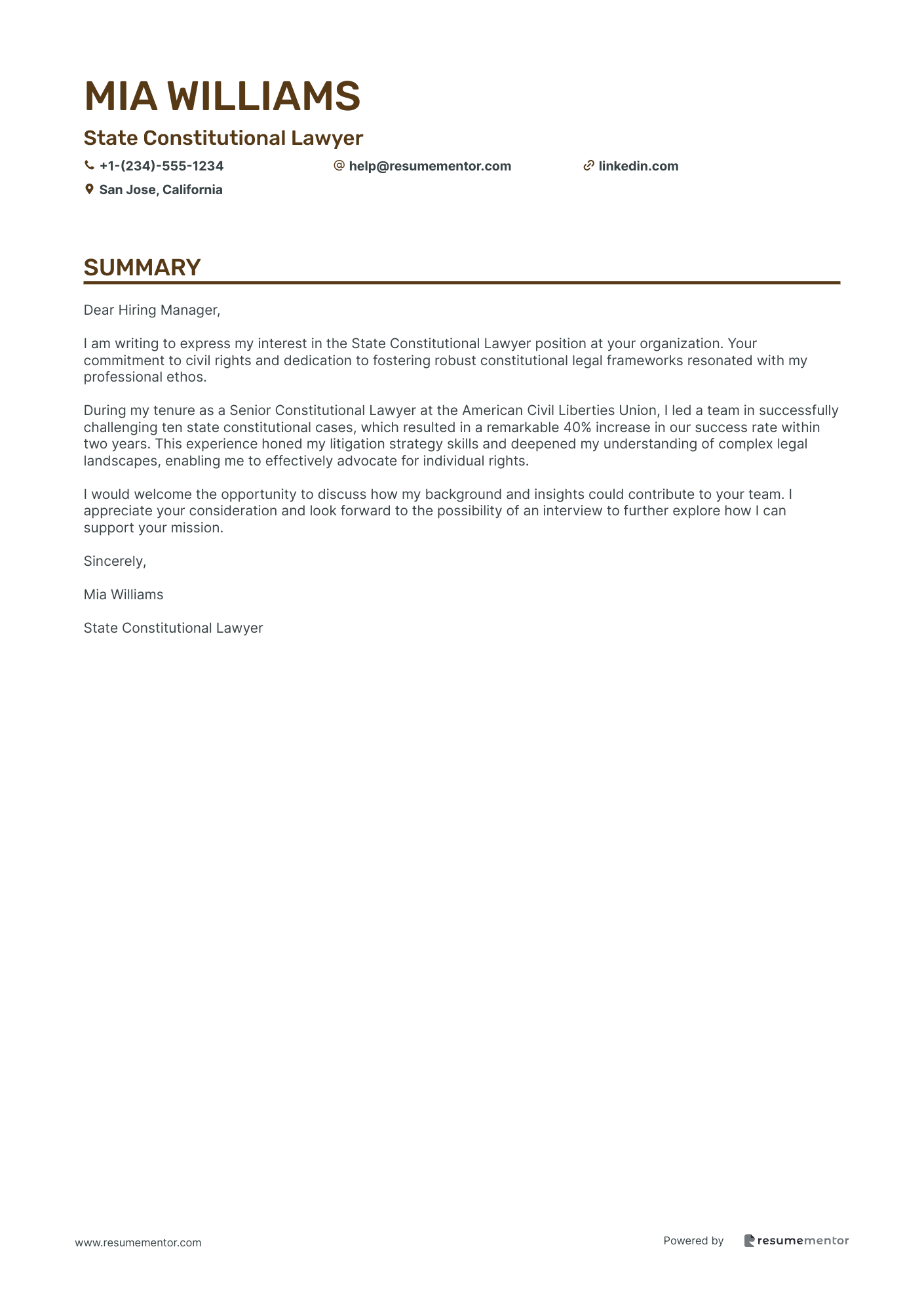
State Constitutional Lawyer
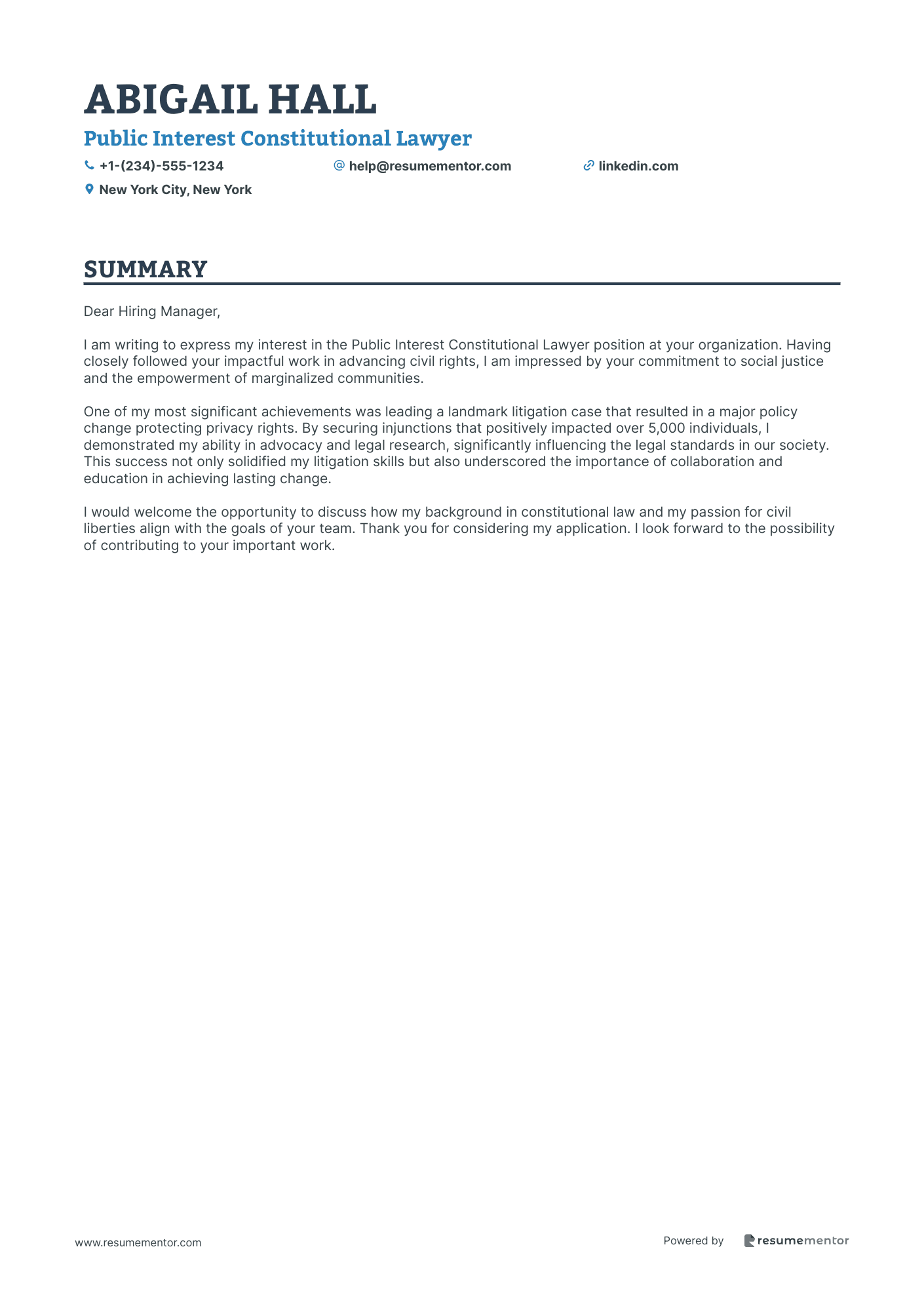
Public Interest Constitutional Lawyer
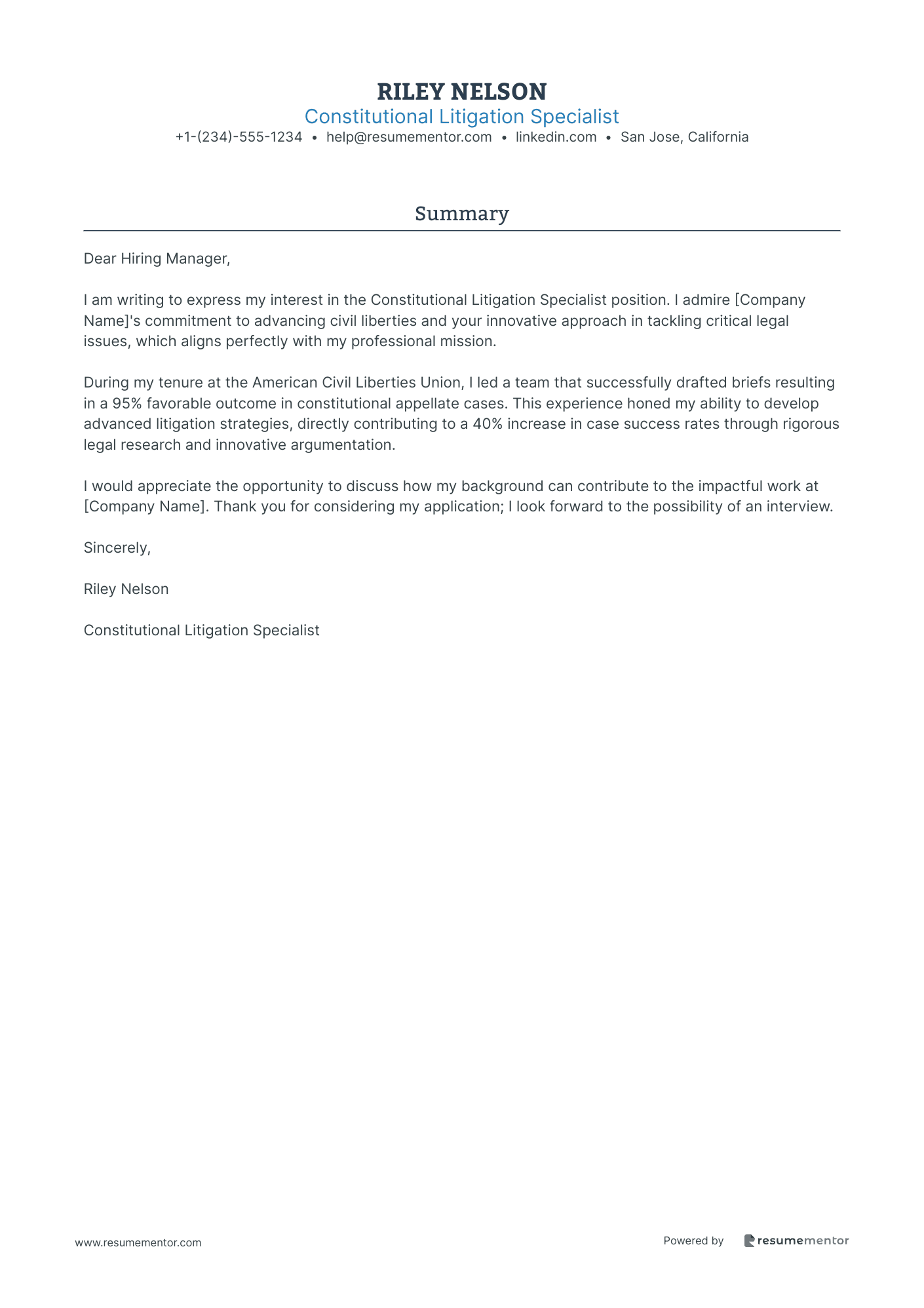
Constitutional Litigation Specialist
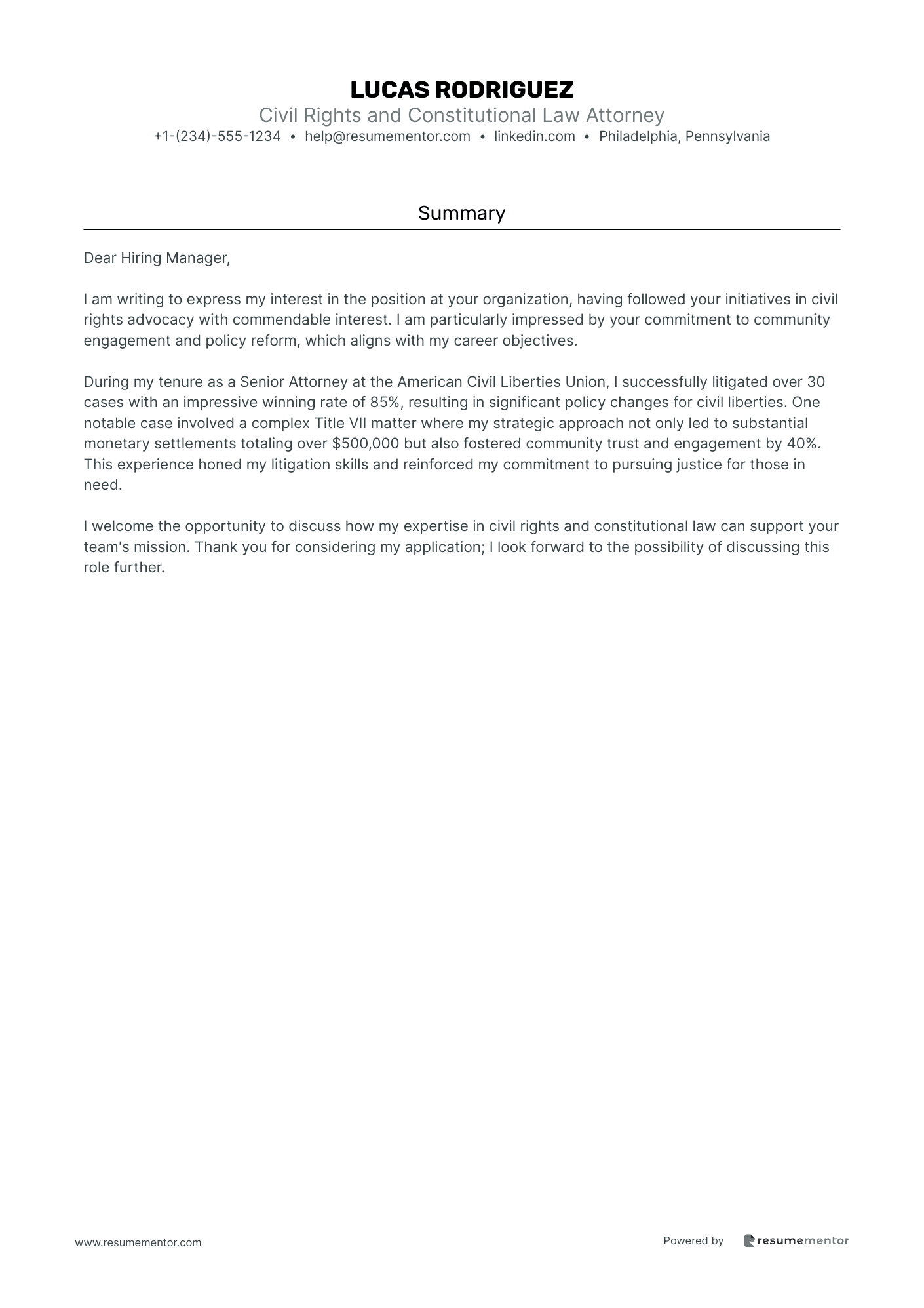
Civil Rights and Constitutional Law Attorney
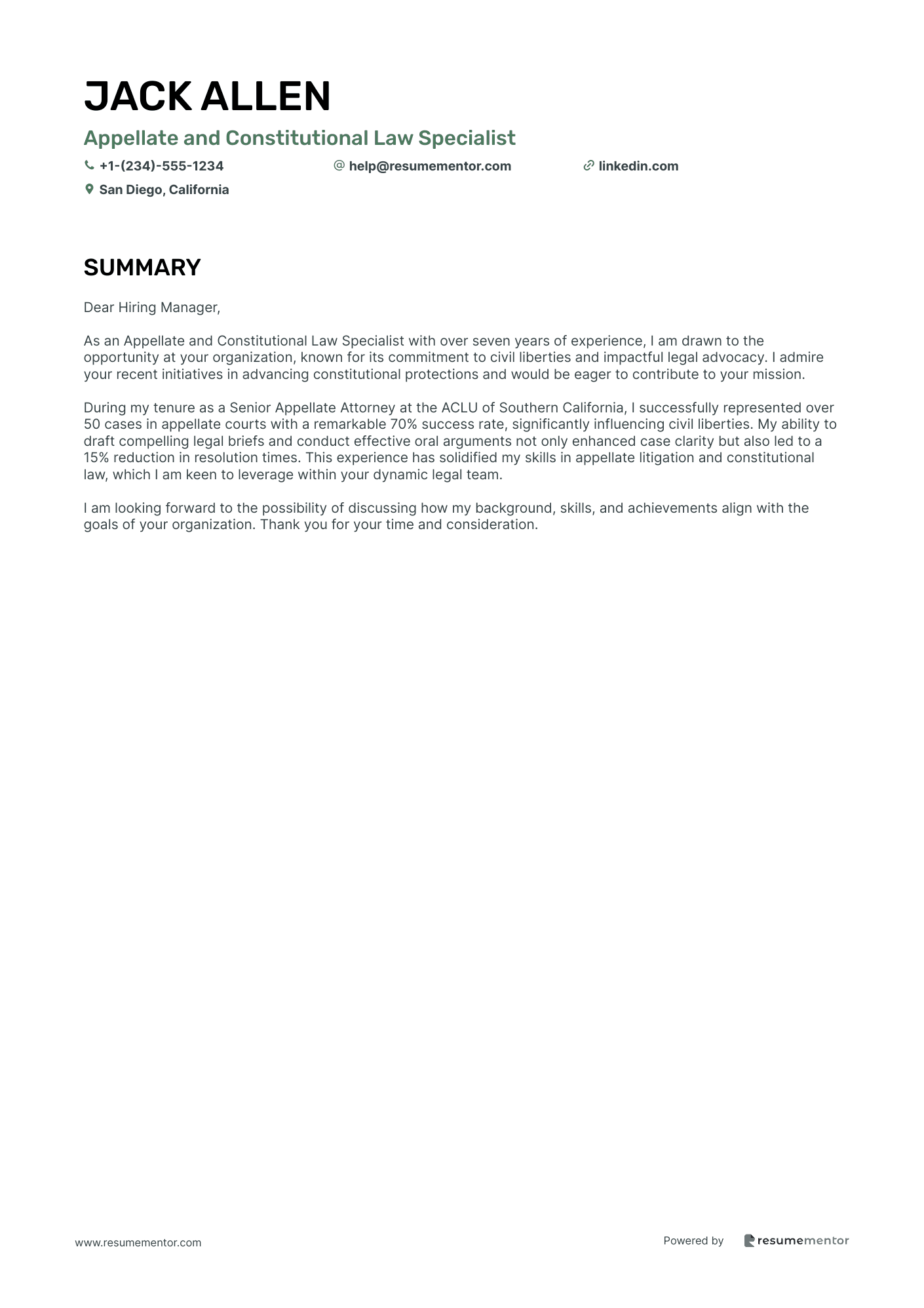
Appellate and Constitutional Law Specialist
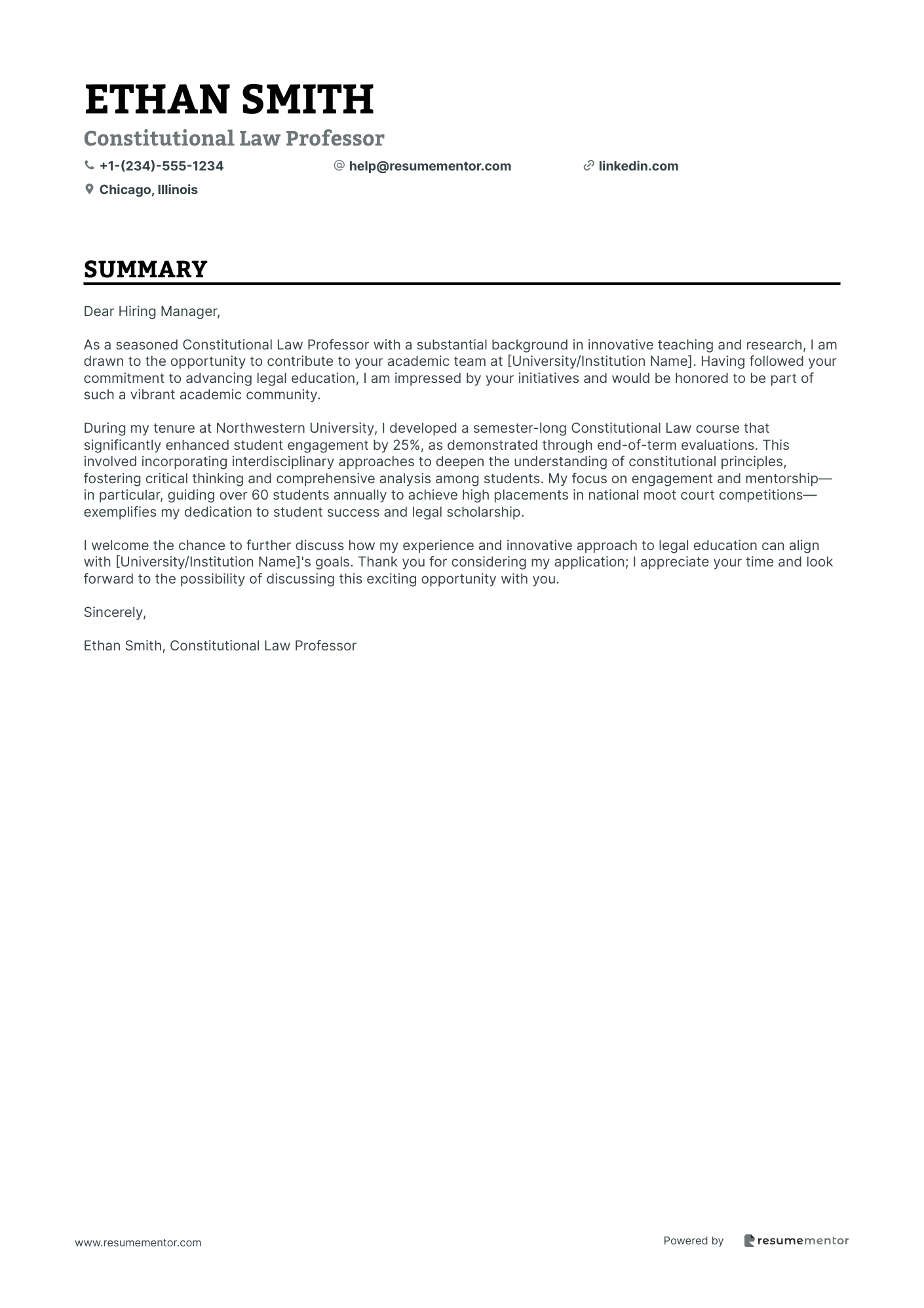
Constitutional Law Professor
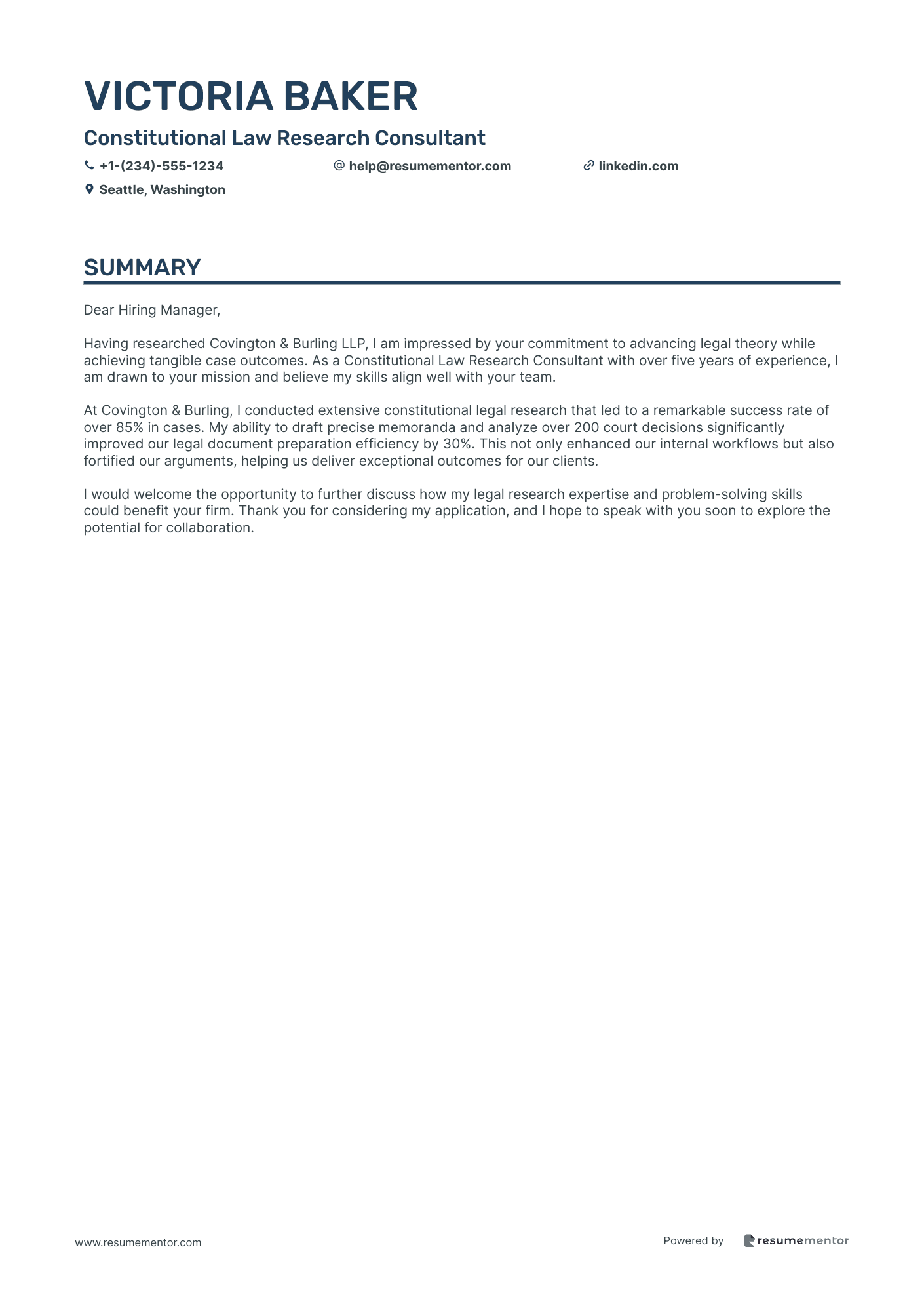
Constitutional Law Research Consultant
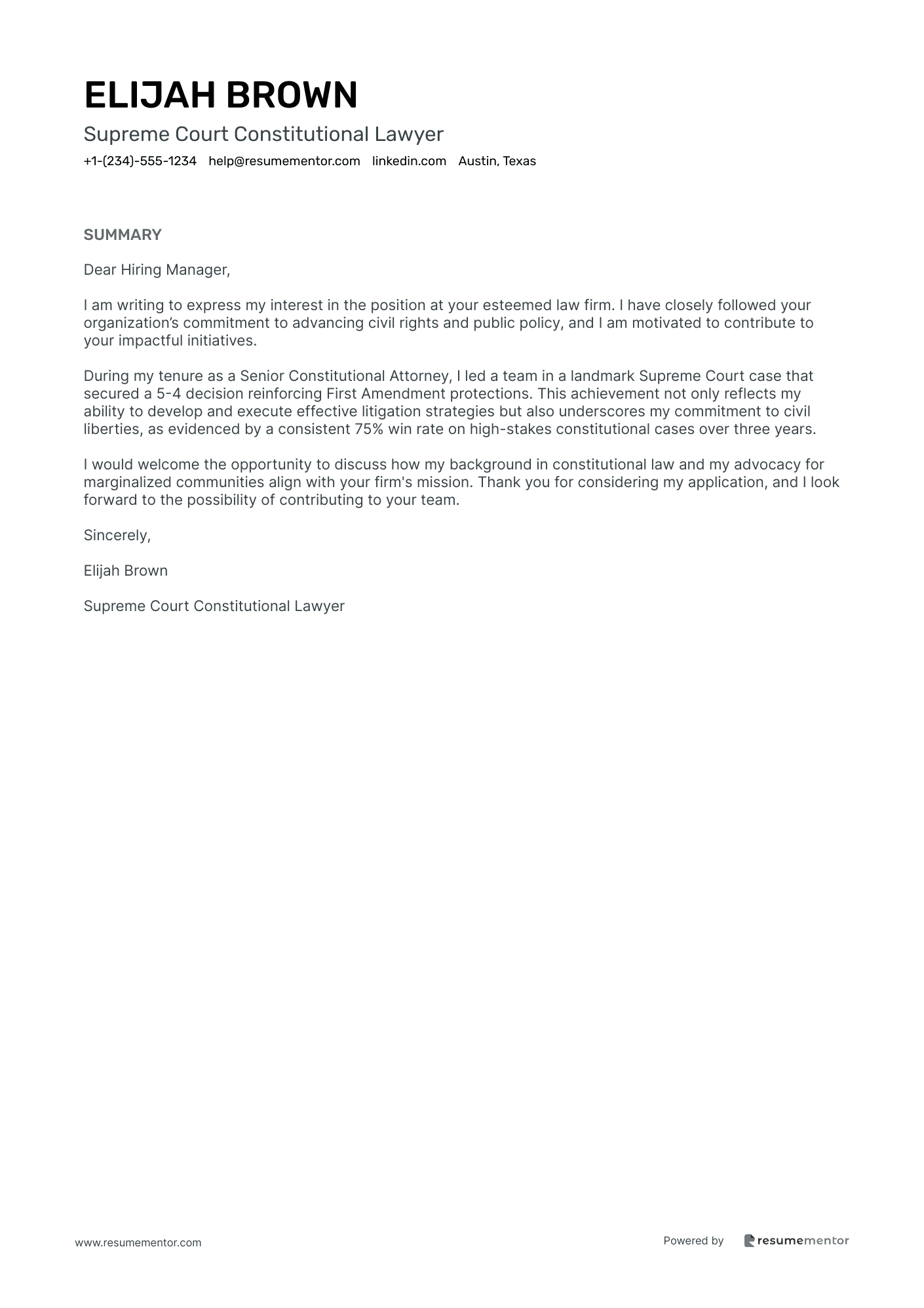
Supreme Court Constitutional Lawyer
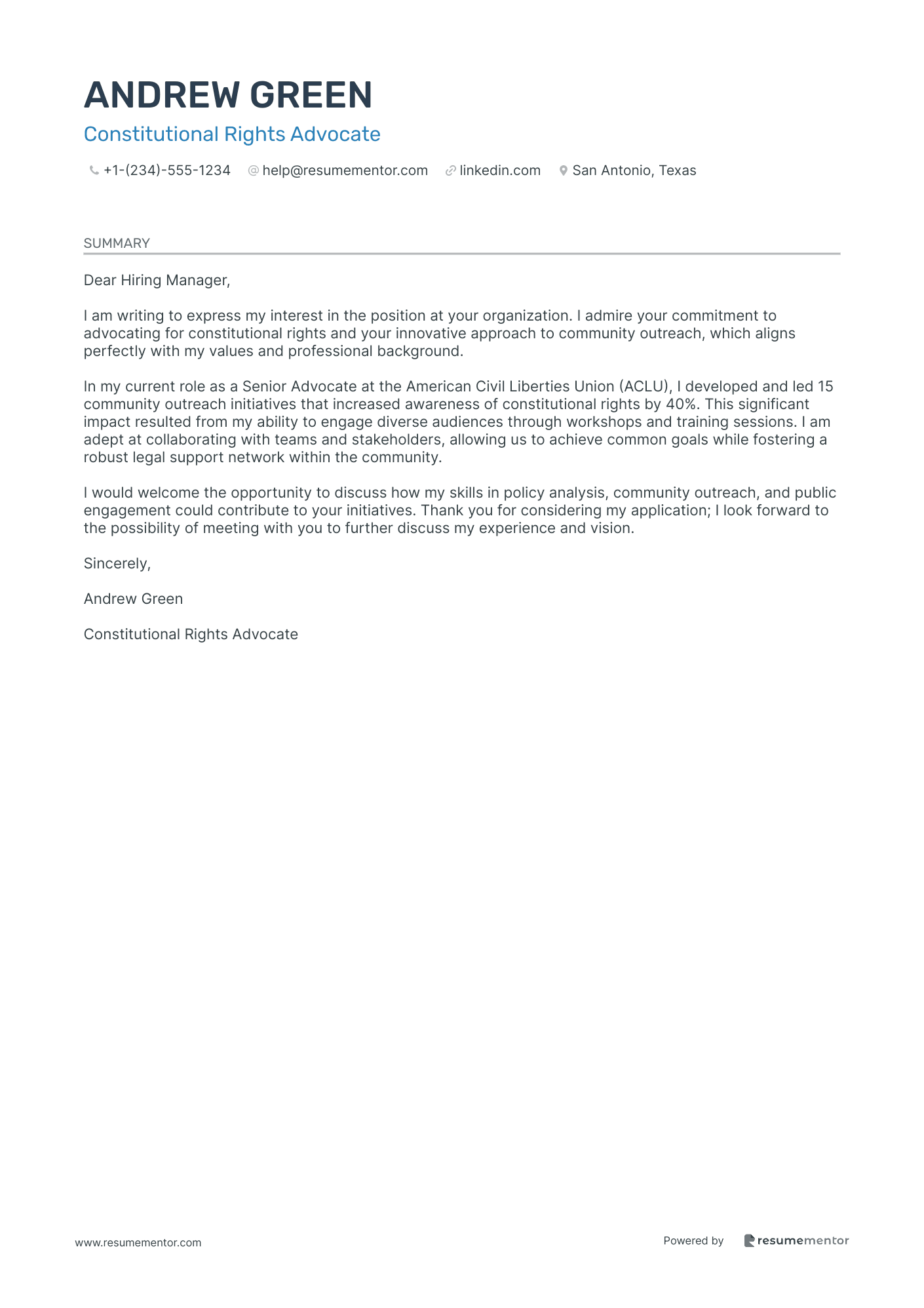
Constitutional Rights Advocate

Federal Constitutional Lawyer cover letter sample
When applying for this position, focus on your experience with constitutional law and any relevant case work. Highlight your legal research skills and your ability to interpret complex legal documents. Include any internships or clerkships in government or public interest law that demonstrate your commitment. Discuss your advocacy experience, particularly in court or legislative settings. Provide examples of how your legal expertise has achieved favorable outcomes or resolved conflicts, using a 'skill-action-result' format to showcase your impactful contributions.
Harper Garcia
Federal Constitutional Lawyer
Summary
Dear Hiring Manager,
Having researched your organization, I am impressed by your commitment to advancing civil rights and the pivotal role your legal team plays in shaping public policy. I am drawn to the opportunity to contribute my expertise as a Federal Constitutional Lawyer, particularly within an organization that aligns with my passion for justice.
One of my significant achievements involved leading a legal team at the ACLU Legal Department in a landmark case that secured voting rights for over 2 million people. This victory was not just a legal triumph; it was a battle that had profound implications for civil rights across the nation. My role involved drafting comprehensive legal briefs that were pivotal to our strategy, and this effort resulted in a remarkable 90% success rate in federal courts. I believe that my skills in strategic litigation and the ability to articulate complex constitutional issues would be an asset to your department.
I would welcome the chance to discuss how my background and skills would contribute to your team. Thank you for considering my application. I look forward to the possibility of discussing this position further.
State Constitutional Lawyer cover letter sample
When applying for this role, focus on your experience with constitutional law and relevant litigation. Highlight any clerkships or internships that involved constitutional issues. Mention your familiarity with significant cases and legislation. It's essential to showcase your research and writing skills, especially if you have published articles or papers on related topics. Provide specific examples of how your legal arguments have successfully influenced outcomes in cases or policy discussions. Demonstrating a strong commitment to justice and public service will further strengthen your application.
Mia Williams
State Constitutional Lawyer
Summary
Dear Hiring Manager,
I am writing to express my interest in the State Constitutional Lawyer position at your organization. Your commitment to civil rights and dedication to fostering robust constitutional legal frameworks resonated with my professional ethos.
During my tenure as a Senior Constitutional Lawyer at the American Civil Liberties Union, I led a team in successfully challenging ten state constitutional cases, which resulted in a remarkable 40% increase in our success rate within two years. This experience honed my litigation strategy skills and deepened my understanding of complex legal landscapes, enabling me to effectively advocate for individual rights.
I would welcome the opportunity to discuss how my background and insights could contribute to your team. I appreciate your consideration and look forward to the possibility of an interview to further explore how I can support your mission.
Sincerely,
Mia Williams
State Constitutional Lawyer
Public Interest Constitutional Lawyer cover letter sample
When crafting your cover letter, focus on any relevant legal experience, particularly in public interest litigation or constitutional law. Highlight your research and analytical skills, as well as your ability to communicate complex legal concepts clearly. Include any internships or volunteer work with nonprofits that advocate for civil rights or social justice. If you've participated in moot court or legal writing competitions, mention these to demonstrate your skills in advocacy. Use specific examples of cases or projects that illustrate your commitment to serving the public good.
Abigail Hall
Public Interest Constitutional Lawyer
Summary
Dear Hiring Manager,
I am writing to express my interest in the Public Interest Constitutional Lawyer position at your organization. Having closely followed your impactful work in advancing civil rights, I am impressed by your commitment to social justice and the empowerment of marginalized communities.
One of my most significant achievements was leading a landmark litigation case that resulted in a major policy change protecting privacy rights. By securing injunctions that positively impacted over 5,000 individuals, I demonstrated my ability in advocacy and legal research, significantly influencing the legal standards in our society. This success not only solidified my litigation skills but also underscored the importance of collaboration and education in achieving lasting change.
I would welcome the opportunity to discuss how my background in constitutional law and my passion for civil liberties align with the goals of your team. Thank you for considering my application. I look forward to the possibility of contributing to your important work.
Constitutional Litigation Specialist cover letter sample
When crafting your cover letter, emphasize any practical experience with legal research and case analysis. Highlight your understanding of constitutional law and any relevant coursework, such as 'Constitutional Rights' or 'Civil Liberties'. Be sure to mention your experience in trial preparation or post-conviction relief. Provide examples of successful outcomes you contributed to, detailing your role in the process. Use the 'skill-action-result' format to illustrate how your expertise has positively affected case results and client satisfaction, showcasing your ability to adapt and deliver in high-pressure situations.
Riley Nelson
Constitutional Litigation Specialist
Summary
Dear Hiring Manager,
I am writing to express my interest in the Constitutional Litigation Specialist position. I admire [Company Name]'s commitment to advancing civil liberties and your innovative approach in tackling critical legal issues, which aligns perfectly with my professional mission.
During my tenure at the American Civil Liberties Union, I led a team that successfully drafted briefs resulting in a 95% favorable outcome in constitutional appellate cases. This experience honed my ability to develop advanced litigation strategies, directly contributing to a 40% increase in case success rates through rigorous legal research and innovative argumentation.
I would appreciate the opportunity to discuss how my background can contribute to the impactful work at [Company Name]. Thank you for considering my application; I look forward to the possibility of an interview.
Sincerely,
Riley Nelson
Constitutional Litigation Specialist
Civil Rights and Constitutional Law Attorney cover letter sample
Highlight any experience with litigation, mediation, or policy advocacy in your cover letter. Mention specific cases or issues you have worked on that demonstrate your commitment to civil rights and justice. Strong analytical and research skills are essential, so be sure to detail your familiarity with constitutional law and relevant statutes. If you’ve published articles or participated in legal clinics, include this information to show your dedication. Use the 'skill-action-result' approach to illustrate how your actions contributed to positive legal outcomes or community impact.
Lucas Rodriguez
Civil Rights and Constitutional Law Attorney
Summary
Dear Hiring Manager,
I am writing to express my interest in the position at your organization, having followed your initiatives in civil rights advocacy with commendable interest. I am particularly impressed by your commitment to community engagement and policy reform, which aligns with my career objectives.
During my tenure as a Senior Attorney at the American Civil Liberties Union, I successfully litigated over 30 cases with an impressive winning rate of 85%, resulting in significant policy changes for civil liberties. One notable case involved a complex Title VII matter where my strategic approach not only led to substantial monetary settlements totaling over $500,000 but also fostered community trust and engagement by 40%. This experience honed my litigation skills and reinforced my commitment to pursuing justice for those in need.
I welcome the opportunity to discuss how my expertise in civil rights and constitutional law can support your team's mission. Thank you for considering my application; I look forward to the possibility of discussing this role further.
Appellate and Constitutional Law Specialist cover letter sample
When applying for this position, it's essential to showcase any experience in litigation or legal research related to constitutional law. Highlight your analytical skills and detail your ability to interpret complex legal texts. If you’ve participated in moot court competitions or legal writing courses, be sure to mention these experiences as they demonstrate your commitment. Use specific cases where your legal insight positively influenced outcomes, focusing on the impact of your contributions using a clear 'skill-action-result' framework for added emphasis on results.
Jack Allen
Appellate and Constitutional Law Specialist
Summary
Dear Hiring Manager,
As an Appellate and Constitutional Law Specialist with over seven years of experience, I am drawn to the opportunity at your organization, known for its commitment to civil liberties and impactful legal advocacy. I admire your recent initiatives in advancing constitutional protections and would be eager to contribute to your mission.
During my tenure as a Senior Appellate Attorney at the ACLU of Southern California, I successfully represented over 50 cases in appellate courts with a remarkable 70% success rate, significantly influencing civil liberties. My ability to draft compelling legal briefs and conduct effective oral arguments not only enhanced case clarity but also led to a 15% reduction in resolution times. This experience has solidified my skills in appellate litigation and constitutional law, which I am keen to leverage within your dynamic legal team.
I am looking forward to the possibility of discussing how my background, skills, and achievements align with the goals of your organization. Thank you for your time and consideration.
Constitutional Law Professor cover letter sample
When applying for this academic position, emphasize any previous teaching or research experience relevant to constitutional matters. Highlight your published works or articles in reputable journals, as well as any presentations at conferences. Share your involvement in debate forums or law review committees to showcase your engagement with current legal issues. It’s also essential to mention any advanced degrees or specialized training in constitutional law. Use specific examples to illustrate how your contributions have influenced student learning or enhanced departmental reputation, following a 'skill-action-result' format.
Ethan Smith
Constitutional Law Professor
Summary
Dear Hiring Manager,
As a seasoned Constitutional Law Professor with a substantial background in innovative teaching and research, I am drawn to the opportunity to contribute to your academic team at [University/Institution Name]. Having followed your commitment to advancing legal education, I am impressed by your initiatives and would be honored to be part of such a vibrant academic community.
During my tenure at Northwestern University, I developed a semester-long Constitutional Law course that significantly enhanced student engagement by 25%, as demonstrated through end-of-term evaluations. This involved incorporating interdisciplinary approaches to deepen the understanding of constitutional principles, fostering critical thinking and comprehensive analysis among students. My focus on engagement and mentorship—in particular, guiding over 60 students annually to achieve high placements in national moot court competitions—exemplifies my dedication to student success and legal scholarship.
I welcome the chance to further discuss how my experience and innovative approach to legal education can align with [University/Institution Name]'s goals. Thank you for considering my application; I appreciate your time and look forward to the possibility of discussing this exciting opportunity with you.
Sincerely,
Ethan Smith, Constitutional Law Professor
Constitutional Law Research Consultant cover letter sample
When applying for this type of role, it's important to emphasize any background in legal research or analysis. Highlight your familiarity with case law, statutes, and constitutional principles. If you have published articles or contributed to legal journals, include those to showcase your expertise. Detail any relevant coursework, such as Constitutional Law or Legal Writing, and mention projects that demonstrate your analytical abilities. Use specific examples to explain how your research has informed legal strategies or influenced policy decisions, following a 'skill-action-result' framework.
Victoria Baker
Constitutional Law Research Consultant
Summary
Dear Hiring Manager,
Having researched Covington & Burling LLP, I am impressed by your commitment to advancing legal theory while achieving tangible case outcomes. As a Constitutional Law Research Consultant with over five years of experience, I am drawn to your mission and believe my skills align well with your team.
At Covington & Burling, I conducted extensive constitutional legal research that led to a remarkable success rate of over 85% in cases. My ability to draft precise memoranda and analyze over 200 court decisions significantly improved our legal document preparation efficiency by 30%. This not only enhanced our internal workflows but also fortified our arguments, helping us deliver exceptional outcomes for our clients.
I would welcome the opportunity to further discuss how my legal research expertise and problem-solving skills could benefit your firm. Thank you for considering my application, and I hope to speak with you soon to explore the potential for collaboration.
Supreme Court Constitutional Lawyer cover letter sample
When applying for this position, it's essential to showcase any previous experience in constitutional law or related fields. Highlight your understanding of landmark Supreme Court cases and your ability to interpret complex legal documents. If you have completed specialized courses or earned certifications in constitutional law or advocacy, mention these to demonstrate your commitment. Be sure to provide examples of how your legal research and persuasive writing skills have achieved favorable outcomes for clients or shaped legal precedents, using a 'skill-action-result' framework.
Elijah Brown
Supreme Court Constitutional Lawyer
Summary
Dear Hiring Manager,
I am writing to express my interest in the position at your esteemed law firm. I have closely followed your organization’s commitment to advancing civil rights and public policy, and I am motivated to contribute to your impactful initiatives.
During my tenure as a Senior Constitutional Attorney, I led a team in a landmark Supreme Court case that secured a 5-4 decision reinforcing First Amendment protections. This achievement not only reflects my ability to develop and execute effective litigation strategies but also underscores my commitment to civil liberties, as evidenced by a consistent 75% win rate on high-stakes constitutional cases over three years.
I would welcome the opportunity to discuss how my background in constitutional law and my advocacy for marginalized communities align with your firm's mission. Thank you for considering my application, and I look forward to the possibility of contributing to your team.
Sincerely,
Elijah Brown
Supreme Court Constitutional Lawyer
Constitutional Rights Advocate cover letter sample
When crafting your cover letter, emphasize your experience in advocating for civil liberties and social justice. Detail your involvement in community outreach or legal clinics that focused on protecting individual rights. Highlight specific initiatives you've led or supported that resulted in tangible change, such as policy reforms or awareness campaigns. Include any relevant coursework, workshops, or certifications in human rights, legal studies, or advocacy techniques. Use concrete examples to showcase your ability to engage diverse audiences and the impact your work has had on communities or organizations.
Andrew Green
Constitutional Rights Advocate
Summary
Dear Hiring Manager,
I am writing to express my interest in the position at your organization. I admire your commitment to advocating for constitutional rights and your innovative approach to community outreach, which aligns perfectly with my values and professional background.
In my current role as a Senior Advocate at the American Civil Liberties Union (ACLU), I developed and led 15 community outreach initiatives that increased awareness of constitutional rights by 40%. This significant impact resulted from my ability to engage diverse audiences through workshops and training sessions. I am adept at collaborating with teams and stakeholders, allowing us to achieve common goals while fostering a robust legal support network within the community.
I would welcome the opportunity to discuss how my skills in policy analysis, community outreach, and public engagement could contribute to your initiatives. Thank you for considering my application; I look forward to the possibility of meeting with you to further discuss my experience and vision.
Sincerely,
Andrew Green
Constitutional Rights Advocate
Related Articles

Continue Reading
Check more recommended readings to get the job of your dreams.
Resume
Resources
Tools
© 2026. All rights reserved.
Made with love by people who care.
